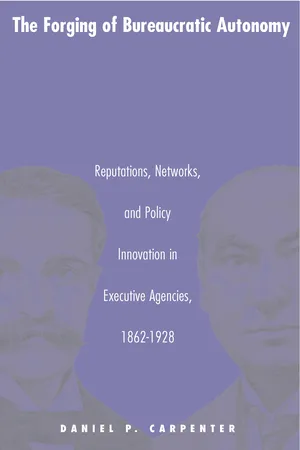
The Forging of Bureaucratic Autonomy
Reputations, Networks, and Policy Innovation in Executive Agencies, 1862-1928
- English
- ePUB (mobile friendly)
- Available on iOS & Android
The Forging of Bureaucratic Autonomy
Reputations, Networks, and Policy Innovation in Executive Agencies, 1862-1928
About this book
Until now political scientists have devoted little attention to the origins of American bureaucracy and the relationship between bureaucratic and interest group politics. In this pioneering book, Daniel Carpenter contributes to our understanding of institutions by presenting a unified study of bureaucratic autonomy in democratic regimes. He focuses on the emergence of bureaucratic policy innovation in the United States during the Progressive Era, asking why the Post Office Department and the Department of Agriculture became politically independent authors of new policy and why the Interior Department did not. To explain these developments, Carpenter offers a new theory of bureaucratic autonomy grounded in organization theory, rational choice models, and network concepts.
According to the author, bureaucracies with unique goals achieve autonomy when their middle-level officials establish reputations among diverse coalitions for effectively providing unique services. These coalitions enable agencies to resist political control and make it costly for politicians to ignore the agencies' ideas. Carpenter assesses his argument through a highly innovative combination of historical narratives, statistical analyses, counterfactuals, and carefully structured policy comparisons. Along the way, he reinterprets the rise of national food and drug regulation, Comstockery and the Progressive anti-vice movement, the emergence of American conservation policy, the ascent of the farm lobby, the creation of postal savings banks and free rural mail delivery, and even the congressional Cannon Revolt of 1910.
Frequently asked questions
- Essential is ideal for learners and professionals who enjoy exploring a wide range of subjects. Access the Essential Library with 800,000+ trusted titles and best-sellers across business, personal growth, and the humanities. Includes unlimited reading time and Standard Read Aloud voice.
- Complete: Perfect for advanced learners and researchers needing full, unrestricted access. Unlock 1.4M+ books across hundreds of subjects, including academic and specialized titles. The Complete Plan also includes advanced features like Premium Read Aloud and Research Assistant.
Please note we cannot support devices running on iOS 13 and Android 7 or earlier. Learn more about using the app.
Information
Table of contents
- Cover Page
- Title Page
- Copyright Page
- Dedication
- Contents
- List of Illustrations
- List of Tables
- Acknowledgments
- Abbreviations
- Introduction
- One: Entrepreneurship, Networked Legitimacy, and Autonomy
- Two: The Clerical State: Obstacles to Bureaucratic Autonomy in Nineteenth-Century America
- Three: The Railway Mail, Comstockery, and the Waning of the Old Postal Regime, 1862–94
- Four: Organizational Renewal and Policy Innovation in the National Postal System, 1890–1910
- Five: The Triumph of the Moral Economy: Finance, Parcels, and the Labor Dilemma in the Post Office, 1908–24
- Six: Science in the Service of Seeds: The USDA, 1862–1900
- Seven: From Seeds to Science: The USDA as University, 1897–1917
- Eight: Multiple Networks and the Autonomy of Bureaus: Departures in Food, Pharmaceutical, and Forestry Policy, 1897–1913
- Nine: Brokerage and Bureaucratic Policymaking: The Cementing of Autonomy at the USDA, 1914–28
- Ten: Structure, Reputation, and the Bureaucratic Failure of Reclamation Policy, 1902–14
- Conclusion: The Politics of Bureaucratic Autonomy
- Notes
- Archival Sources
- Index